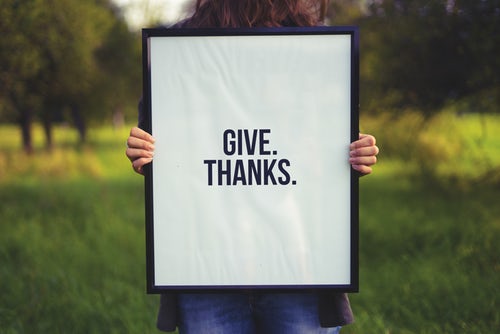Seniors and Depression IV – The Science, Expressions, and Benefits of Gratitude
Recently, I sat down and scanned the titles of the articles I had written over the last two-plus years. The common thread among them is independence, and that was, on my part, a deliberate choice. This is the segue to my next point. The lynchpin undergirding independence is, I believe, choice. I spoke last week about healthy pivots. When you break it down, personal pivots are nothing more than a series of choices. And if those pivots/choices are consistently healthy and positive, the greater the chances of an independent lifestyle. I’m not begrudging anyone an occasional extra dessert or sleeping in on a Saturday morning, not at all. We all need a break from our routines. What I am suggesting is that fighting depression starts first between our ears, with the choices we make. I’m sure some of you are swearing to never again read another of my articles. That’s your choice. Know, though, that I too have made my share of bad, no horrible, decisions.
Depression can be crippling, and I certainly don’t want to make light of how hard overcoming it can be, especially for seniors. Making healthy choices is not always easy, it takes discipline and the ability to recognize the symptoms. These skills come only with time. Many seniors can step back and heal emotionally and then continue moving forward. For a variety of reasons, including age and health challenges, others are unable to do that.
Last week I shared several ideas on how to make healthy pivots away from depression. Another tool for fighting depression is gratitude, and I’m not sure it has ever been given the proper respect it deserves as a positive force. Before we look at a few of the benefits, lets first look at the science behind it, and some ways it can be expressed.
The Science Behind Gratitude
When I think of gratitude, I am flooded not by definitions, but examples. Gratitude is derived from the Latin root gratia meaning gratefulness or thankfulness.
Positivepsychology.com, a leading online resource of research and data, has this to say, “the effects of gratitude, when practiced daily can be almost the same as medications. It produces a feeling of long-lasting happiness and contentment, the physiological basis of which lies at the neurotransmitter level. When we express gratitude and receive the same, our brain releases dopamine and serotonin, the two crucial neurotransmitters responsible for our emotions, and they make us feel ‘good’. They enhance our mood immediately, making us feel happy from the inside. By consciously practicing gratitude every day, we can help these neural pathways to strengthen themselves and ultimately create a permanent grateful and positive nature within ourselves.”
These ‘feel-good messengers’ are responsible for helping us benefit when we practice gratitude. However, before those benefits can be reaped, gratitude must first be expressed.
Ways to Express Gratitude
Expressing gratitude, by definition, means investing in someone besides yourself. Jacqueline Whitmore, a noted author, speaker, and founder of the Protocol School of Palm Beach, shared in Entrepreneur Magazine several ways people can show gratitude.
- Say Thank You
- Listen Intently
- Write a Note
- Help with a Project or run an Errand
- Call Someone
Now that we’ve invested in someone else and the “feel-good neurotransmitters” have been released, there are benefits we can expect to receive.
Benefits
- Greater Optimism – Harvard Health cites several research studies showing that people who consistently express gratitude are generally more optimistic.
- Greater Empathy – Douglas Main, a senior writer for Newsweek, cites research showing that people who more readily express gratitude regularly tend to have more empathy toward others.
- Stronger Relationships – HealthPsychcom, an online resource helping people be happier and healthier, shares how stronger relationships are formed when needs are being recognized and met.
- Better Sleep – Jamie Ducharme, a staff writer for Time, cites research showing ”that feeling grateful helps people sleep better and longer”. The study postulated that the positive emotions generated by gratitude soothe the central nervous system, helping people to relax and experience better quality sleep.
- Increased Self-Esteem – Amy Morin, an author and recognized expert in the field of mental strength, contributing to Forbes, shares studies showing that gratitude can increase one’s self-esteem.
Independence is fragile and there are numerous ways it gradually eroded if not destroyed. Seniors, typically, are more prone to disease and other challenges simply because they’ve lived longer. Hopefully, they have learned along the way how to make healthy pivots and overcome challenges like depression. One of the best tools available is gratitude. Focusing on someone besides yourself is a therapeutic way of warding off depression.
What I shared regarding how to show gratitude and the resulting benefits is not even the tip of the iceberg. There are hundreds of ways to show someone your gratitude and an equal number of benefits to be derived from those expressions. If you’re a senior or know a senior who is feeling a bit down, I encourage you to look for ways to express gratitude toward someone. Reach out and touch someone, you can’t help but feel good.
If you’re feeling brave, I invite you to share below how gratitude has impacted your life. It can be something you did or what someone did for you. Sharing your gratitude will only help someone else feel good. It probably won’t hurt you either.


Recent Comments